Assessing the Impact of Globalization on State Power: A Key Theory
VerifiedAdded on 2023/06/04
|9
|2563
|291
Essay
AI Summary
This essay examines the evolving role of the state in the context of globalization, questioning whether the state has lost power. It begins by establishing the historical context of globalization, from early trade relations to the industrial revolution, and contrasts it with the pre-globalized era where states held significant control. The essay references McLuhan's concept of the "global village" to illustrate the increased interconnectedness and cultural assimilation facilitated by globalization. It further explores the dimensions of globalization—political, social, and economic—and their impact on state functions. The analysis considers arguments that globalization diminishes state control, particularly in economic activities, while also acknowledging perspectives that emphasize the state's continued importance in regulating markets and setting global standards. Ultimately, the essay investigates the complex interplay between globalization and state power, considering various theoretical viewpoints and historical contexts, concluding that while globalization presents challenges to state sovereignty, the state remains a crucial actor in the international arena. Desklib provides this essay and other resources to help students understand globalization.
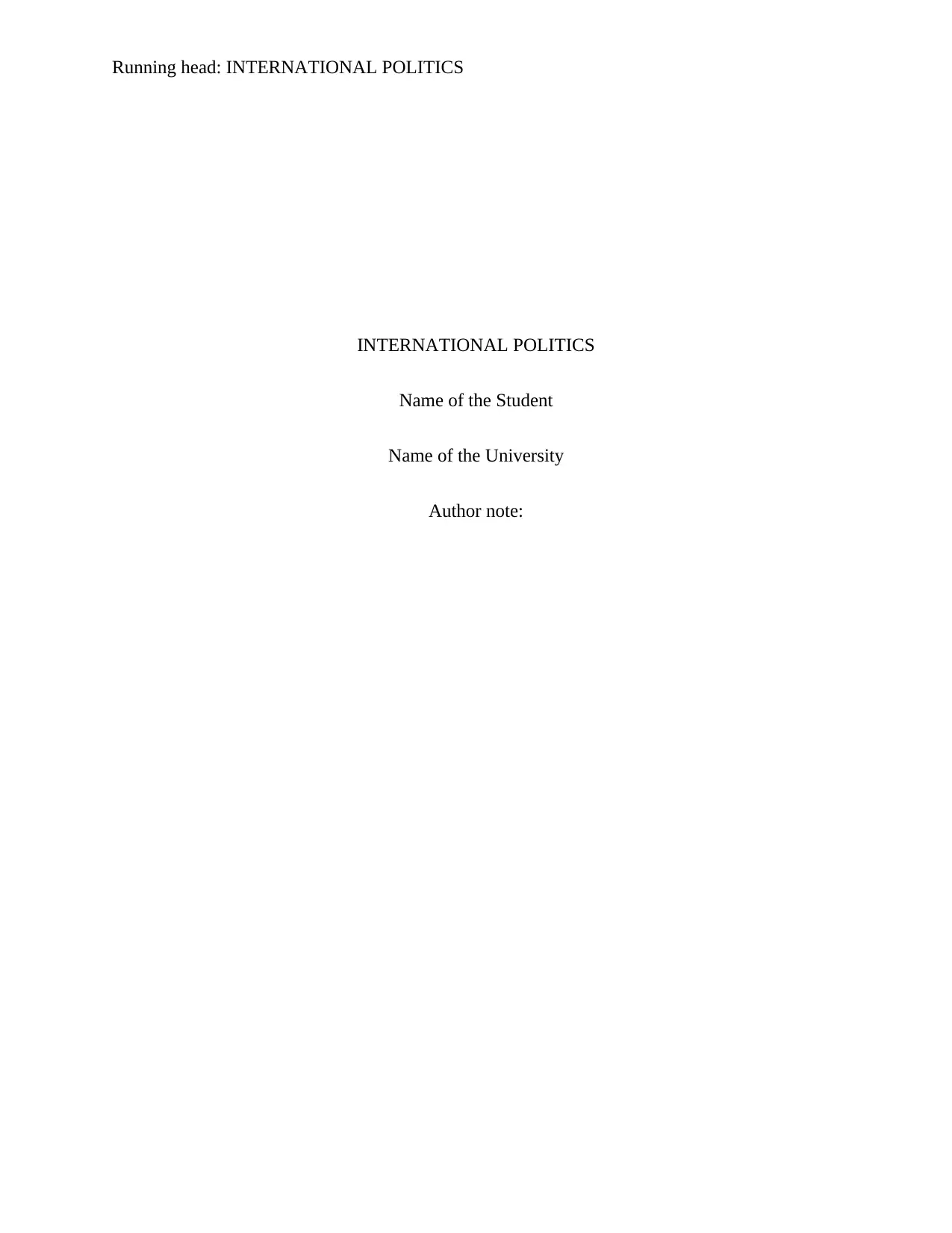
Running head: INTERNATIONAL POLITICS
INTERNATIONAL POLITICS
Name of the Student
Name of the University
Author note:
INTERNATIONAL POLITICS
Name of the Student
Name of the University
Author note:
Paraphrase This Document
Need a fresh take? Get an instant paraphrase of this document with our AI Paraphraser
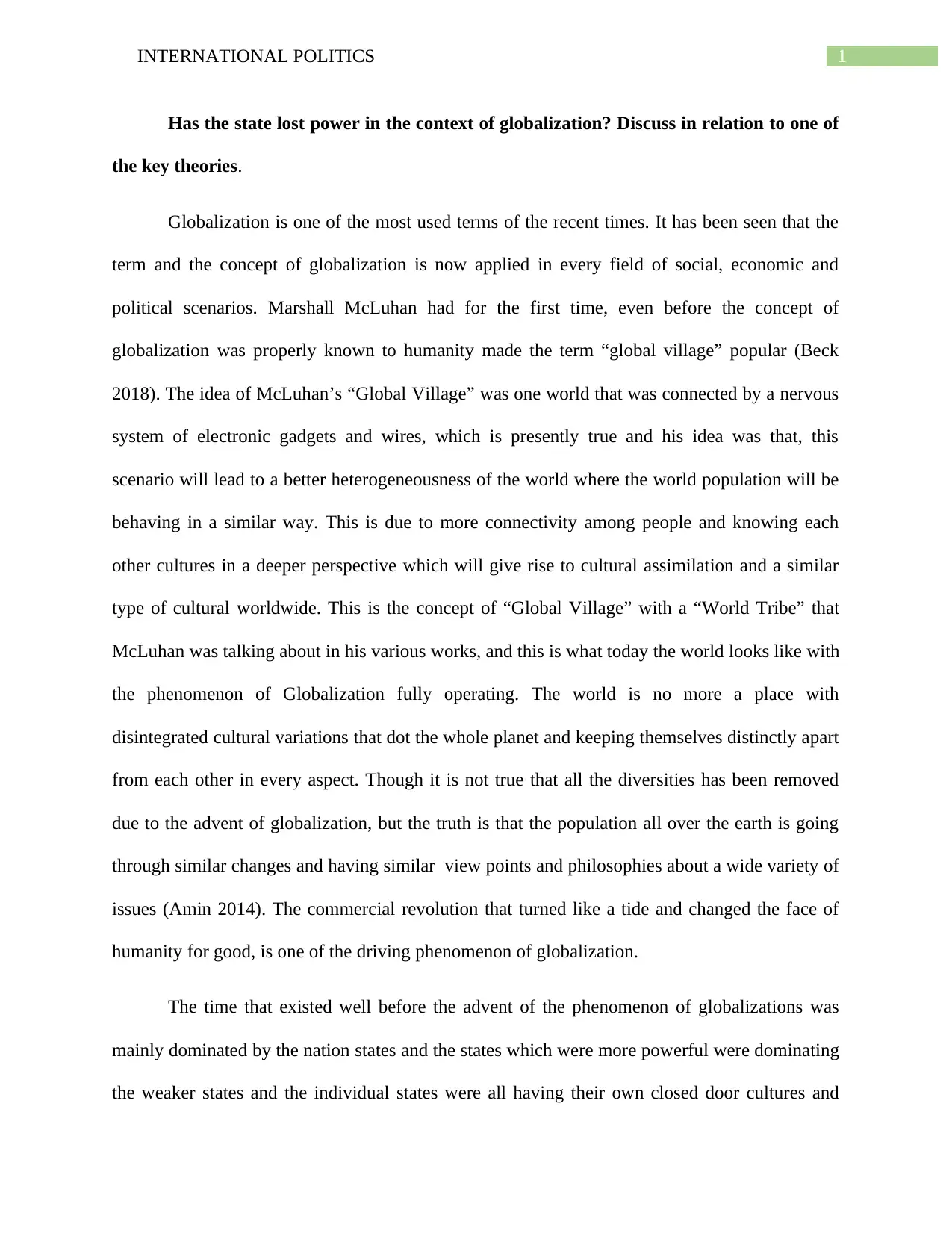
1INTERNATIONAL POLITICS
Has the state lost power in the context of globalization? Discuss in relation to one of
the key theories.
Globalization is one of the most used terms of the recent times. It has been seen that the
term and the concept of globalization is now applied in every field of social, economic and
political scenarios. Marshall McLuhan had for the first time, even before the concept of
globalization was properly known to humanity made the term “global village” popular (Beck
2018). The idea of McLuhan’s “Global Village” was one world that was connected by a nervous
system of electronic gadgets and wires, which is presently true and his idea was that, this
scenario will lead to a better heterogeneousness of the world where the world population will be
behaving in a similar way. This is due to more connectivity among people and knowing each
other cultures in a deeper perspective which will give rise to cultural assimilation and a similar
type of cultural worldwide. This is the concept of “Global Village” with a “World Tribe” that
McLuhan was talking about in his various works, and this is what today the world looks like with
the phenomenon of Globalization fully operating. The world is no more a place with
disintegrated cultural variations that dot the whole planet and keeping themselves distinctly apart
from each other in every aspect. Though it is not true that all the diversities has been removed
due to the advent of globalization, but the truth is that the population all over the earth is going
through similar changes and having similar view points and philosophies about a wide variety of
issues (Amin 2014). The commercial revolution that turned like a tide and changed the face of
humanity for good, is one of the driving phenomenon of globalization.
The time that existed well before the advent of the phenomenon of globalizations was
mainly dominated by the nation states and the states which were more powerful were dominating
the weaker states and the individual states were all having their own closed door cultures and
Has the state lost power in the context of globalization? Discuss in relation to one of
the key theories.
Globalization is one of the most used terms of the recent times. It has been seen that the
term and the concept of globalization is now applied in every field of social, economic and
political scenarios. Marshall McLuhan had for the first time, even before the concept of
globalization was properly known to humanity made the term “global village” popular (Beck
2018). The idea of McLuhan’s “Global Village” was one world that was connected by a nervous
system of electronic gadgets and wires, which is presently true and his idea was that, this
scenario will lead to a better heterogeneousness of the world where the world population will be
behaving in a similar way. This is due to more connectivity among people and knowing each
other cultures in a deeper perspective which will give rise to cultural assimilation and a similar
type of cultural worldwide. This is the concept of “Global Village” with a “World Tribe” that
McLuhan was talking about in his various works, and this is what today the world looks like with
the phenomenon of Globalization fully operating. The world is no more a place with
disintegrated cultural variations that dot the whole planet and keeping themselves distinctly apart
from each other in every aspect. Though it is not true that all the diversities has been removed
due to the advent of globalization, but the truth is that the population all over the earth is going
through similar changes and having similar view points and philosophies about a wide variety of
issues (Amin 2014). The commercial revolution that turned like a tide and changed the face of
humanity for good, is one of the driving phenomenon of globalization.
The time that existed well before the advent of the phenomenon of globalizations was
mainly dominated by the nation states and the states which were more powerful were dominating
the weaker states and the individual states were all having their own closed door cultures and
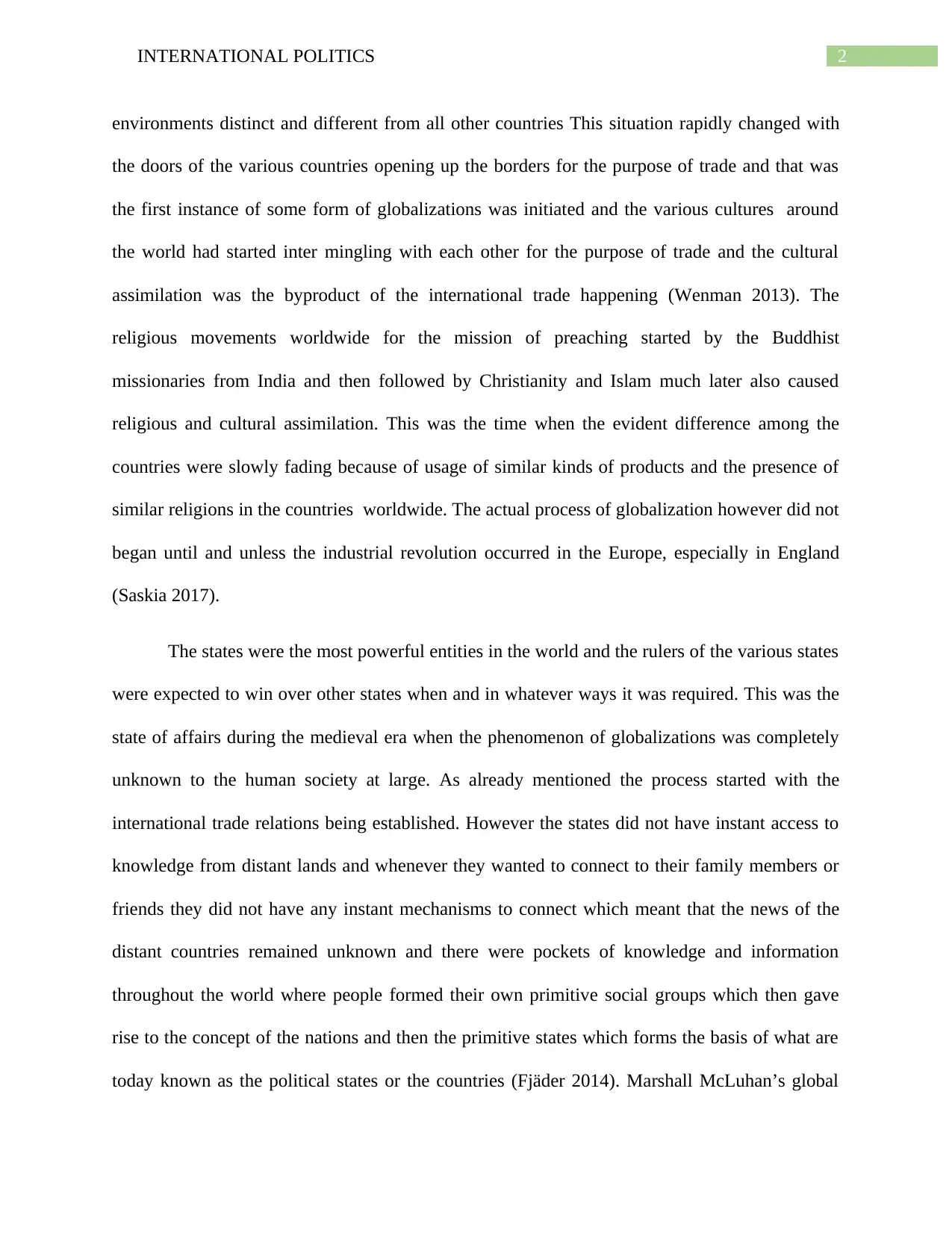
2INTERNATIONAL POLITICS
environments distinct and different from all other countries This situation rapidly changed with
the doors of the various countries opening up the borders for the purpose of trade and that was
the first instance of some form of globalizations was initiated and the various cultures around
the world had started inter mingling with each other for the purpose of trade and the cultural
assimilation was the byproduct of the international trade happening (Wenman 2013). The
religious movements worldwide for the mission of preaching started by the Buddhist
missionaries from India and then followed by Christianity and Islam much later also caused
religious and cultural assimilation. This was the time when the evident difference among the
countries were slowly fading because of usage of similar kinds of products and the presence of
similar religions in the countries worldwide. The actual process of globalization however did not
began until and unless the industrial revolution occurred in the Europe, especially in England
(Saskia 2017).
The states were the most powerful entities in the world and the rulers of the various states
were expected to win over other states when and in whatever ways it was required. This was the
state of affairs during the medieval era when the phenomenon of globalizations was completely
unknown to the human society at large. As already mentioned the process started with the
international trade relations being established. However the states did not have instant access to
knowledge from distant lands and whenever they wanted to connect to their family members or
friends they did not have any instant mechanisms to connect which meant that the news of the
distant countries remained unknown and there were pockets of knowledge and information
throughout the world where people formed their own primitive social groups which then gave
rise to the concept of the nations and then the primitive states which forms the basis of what are
today known as the political states or the countries (Fjäder 2014). Marshall McLuhan’s global
environments distinct and different from all other countries This situation rapidly changed with
the doors of the various countries opening up the borders for the purpose of trade and that was
the first instance of some form of globalizations was initiated and the various cultures around
the world had started inter mingling with each other for the purpose of trade and the cultural
assimilation was the byproduct of the international trade happening (Wenman 2013). The
religious movements worldwide for the mission of preaching started by the Buddhist
missionaries from India and then followed by Christianity and Islam much later also caused
religious and cultural assimilation. This was the time when the evident difference among the
countries were slowly fading because of usage of similar kinds of products and the presence of
similar religions in the countries worldwide. The actual process of globalization however did not
began until and unless the industrial revolution occurred in the Europe, especially in England
(Saskia 2017).
The states were the most powerful entities in the world and the rulers of the various states
were expected to win over other states when and in whatever ways it was required. This was the
state of affairs during the medieval era when the phenomenon of globalizations was completely
unknown to the human society at large. As already mentioned the process started with the
international trade relations being established. However the states did not have instant access to
knowledge from distant lands and whenever they wanted to connect to their family members or
friends they did not have any instant mechanisms to connect which meant that the news of the
distant countries remained unknown and there were pockets of knowledge and information
throughout the world where people formed their own primitive social groups which then gave
rise to the concept of the nations and then the primitive states which forms the basis of what are
today known as the political states or the countries (Fjäder 2014). Marshall McLuhan’s global
⊘ This is a preview!⊘
Do you want full access?
Subscribe today to unlock all pages.

Trusted by 1+ million students worldwide
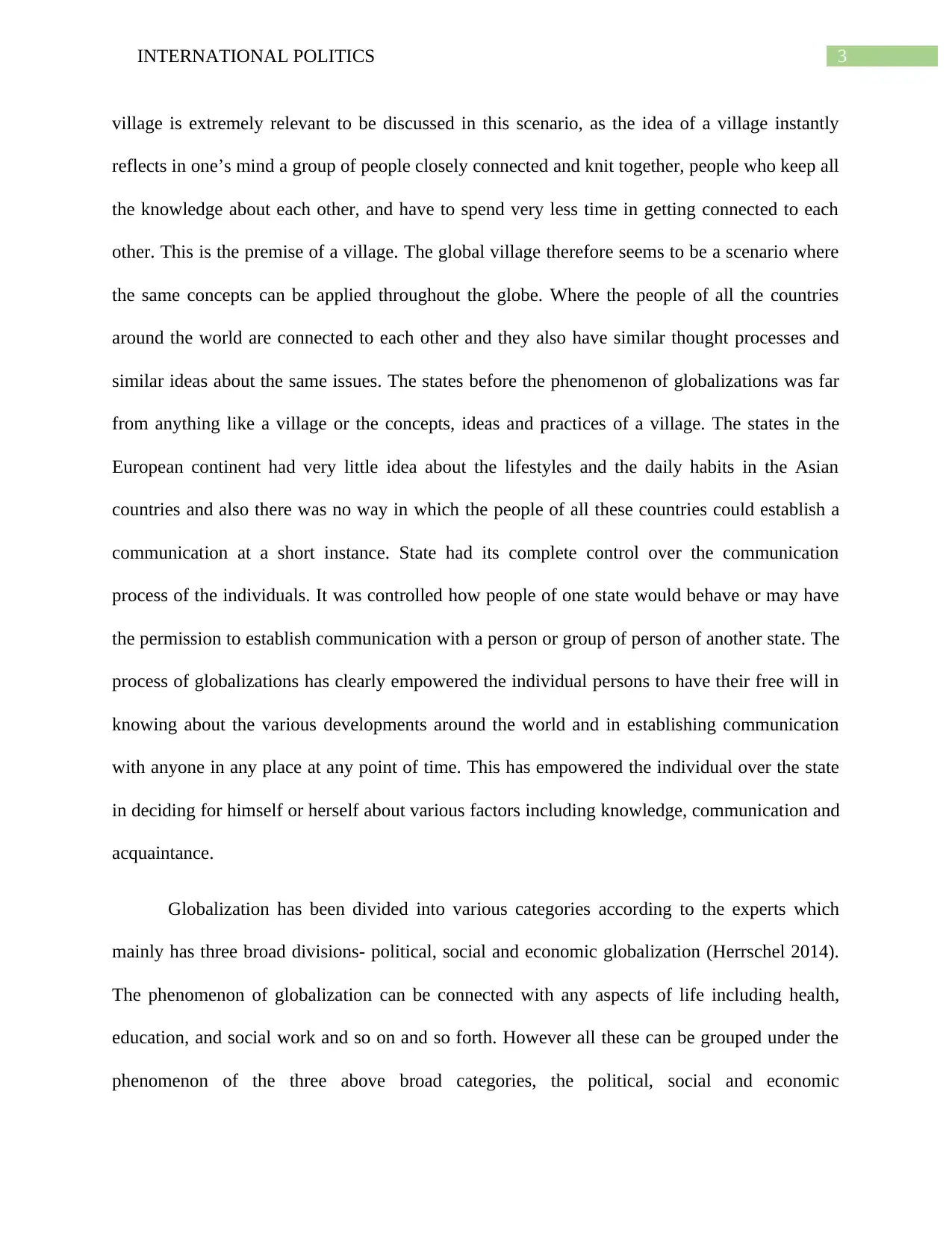
3INTERNATIONAL POLITICS
village is extremely relevant to be discussed in this scenario, as the idea of a village instantly
reflects in one’s mind a group of people closely connected and knit together, people who keep all
the knowledge about each other, and have to spend very less time in getting connected to each
other. This is the premise of a village. The global village therefore seems to be a scenario where
the same concepts can be applied throughout the globe. Where the people of all the countries
around the world are connected to each other and they also have similar thought processes and
similar ideas about the same issues. The states before the phenomenon of globalizations was far
from anything like a village or the concepts, ideas and practices of a village. The states in the
European continent had very little idea about the lifestyles and the daily habits in the Asian
countries and also there was no way in which the people of all these countries could establish a
communication at a short instance. State had its complete control over the communication
process of the individuals. It was controlled how people of one state would behave or may have
the permission to establish communication with a person or group of person of another state. The
process of globalizations has clearly empowered the individual persons to have their free will in
knowing about the various developments around the world and in establishing communication
with anyone in any place at any point of time. This has empowered the individual over the state
in deciding for himself or herself about various factors including knowledge, communication and
acquaintance.
Globalization has been divided into various categories according to the experts which
mainly has three broad divisions- political, social and economic globalization (Herrschel 2014).
The phenomenon of globalization can be connected with any aspects of life including health,
education, and social work and so on and so forth. However all these can be grouped under the
phenomenon of the three above broad categories, the political, social and economic
village is extremely relevant to be discussed in this scenario, as the idea of a village instantly
reflects in one’s mind a group of people closely connected and knit together, people who keep all
the knowledge about each other, and have to spend very less time in getting connected to each
other. This is the premise of a village. The global village therefore seems to be a scenario where
the same concepts can be applied throughout the globe. Where the people of all the countries
around the world are connected to each other and they also have similar thought processes and
similar ideas about the same issues. The states before the phenomenon of globalizations was far
from anything like a village or the concepts, ideas and practices of a village. The states in the
European continent had very little idea about the lifestyles and the daily habits in the Asian
countries and also there was no way in which the people of all these countries could establish a
communication at a short instance. State had its complete control over the communication
process of the individuals. It was controlled how people of one state would behave or may have
the permission to establish communication with a person or group of person of another state. The
process of globalizations has clearly empowered the individual persons to have their free will in
knowing about the various developments around the world and in establishing communication
with anyone in any place at any point of time. This has empowered the individual over the state
in deciding for himself or herself about various factors including knowledge, communication and
acquaintance.
Globalization has been divided into various categories according to the experts which
mainly has three broad divisions- political, social and economic globalization (Herrschel 2014).
The phenomenon of globalization can be connected with any aspects of life including health,
education, and social work and so on and so forth. However all these can be grouped under the
phenomenon of the three above broad categories, the political, social and economic
Paraphrase This Document
Need a fresh take? Get an instant paraphrase of this document with our AI Paraphraser
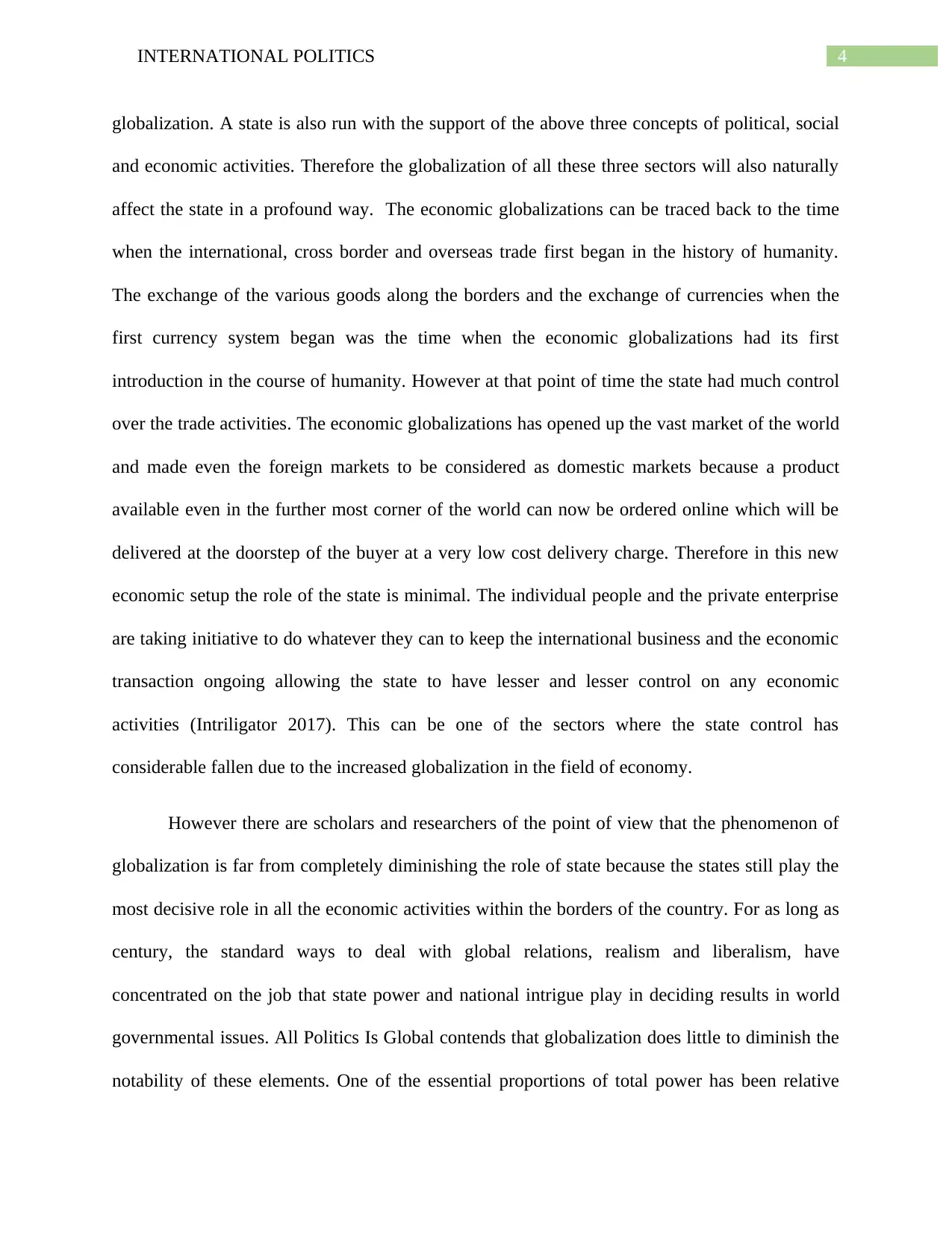
4INTERNATIONAL POLITICS
globalization. A state is also run with the support of the above three concepts of political, social
and economic activities. Therefore the globalization of all these three sectors will also naturally
affect the state in a profound way. The economic globalizations can be traced back to the time
when the international, cross border and overseas trade first began in the history of humanity.
The exchange of the various goods along the borders and the exchange of currencies when the
first currency system began was the time when the economic globalizations had its first
introduction in the course of humanity. However at that point of time the state had much control
over the trade activities. The economic globalizations has opened up the vast market of the world
and made even the foreign markets to be considered as domestic markets because a product
available even in the further most corner of the world can now be ordered online which will be
delivered at the doorstep of the buyer at a very low cost delivery charge. Therefore in this new
economic setup the role of the state is minimal. The individual people and the private enterprise
are taking initiative to do whatever they can to keep the international business and the economic
transaction ongoing allowing the state to have lesser and lesser control on any economic
activities (Intriligator 2017). This can be one of the sectors where the state control has
considerable fallen due to the increased globalization in the field of economy.
However there are scholars and researchers of the point of view that the phenomenon of
globalization is far from completely diminishing the role of state because the states still play the
most decisive role in all the economic activities within the borders of the country. For as long as
century, the standard ways to deal with global relations, realism and liberalism, have
concentrated on the job that state power and national intrigue play in deciding results in world
governmental issues. All Politics Is Global contends that globalization does little to diminish the
notability of these elements. One of the essential proportions of total power has been relative
globalization. A state is also run with the support of the above three concepts of political, social
and economic activities. Therefore the globalization of all these three sectors will also naturally
affect the state in a profound way. The economic globalizations can be traced back to the time
when the international, cross border and overseas trade first began in the history of humanity.
The exchange of the various goods along the borders and the exchange of currencies when the
first currency system began was the time when the economic globalizations had its first
introduction in the course of humanity. However at that point of time the state had much control
over the trade activities. The economic globalizations has opened up the vast market of the world
and made even the foreign markets to be considered as domestic markets because a product
available even in the further most corner of the world can now be ordered online which will be
delivered at the doorstep of the buyer at a very low cost delivery charge. Therefore in this new
economic setup the role of the state is minimal. The individual people and the private enterprise
are taking initiative to do whatever they can to keep the international business and the economic
transaction ongoing allowing the state to have lesser and lesser control on any economic
activities (Intriligator 2017). This can be one of the sectors where the state control has
considerable fallen due to the increased globalization in the field of economy.
However there are scholars and researchers of the point of view that the phenomenon of
globalization is far from completely diminishing the role of state because the states still play the
most decisive role in all the economic activities within the borders of the country. For as long as
century, the standard ways to deal with global relations, realism and liberalism, have
concentrated on the job that state power and national intrigue play in deciding results in world
governmental issues. All Politics Is Global contends that globalization does little to diminish the
notability of these elements. One of the essential proportions of total power has been relative
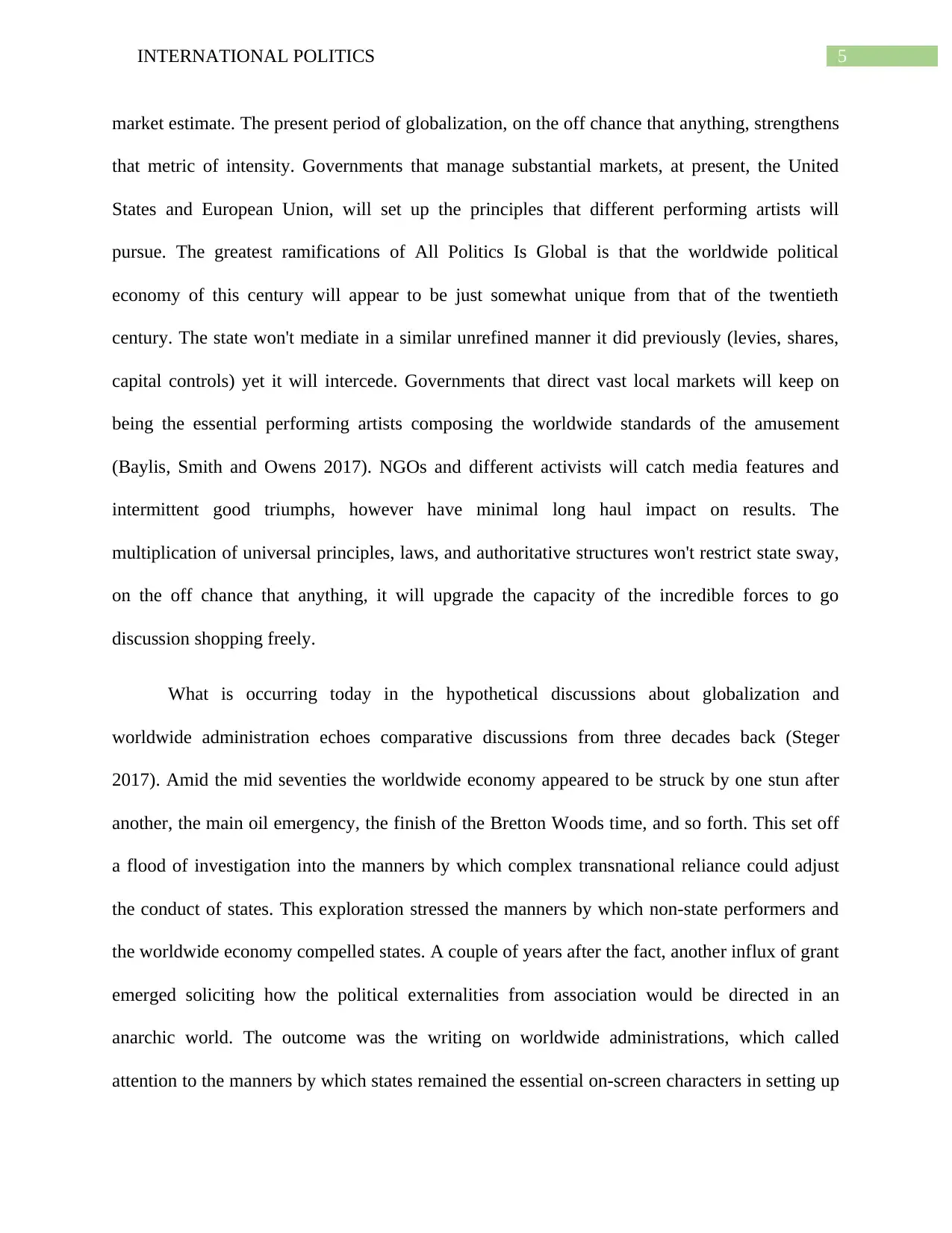
5INTERNATIONAL POLITICS
market estimate. The present period of globalization, on the off chance that anything, strengthens
that metric of intensity. Governments that manage substantial markets, at present, the United
States and European Union, will set up the principles that different performing artists will
pursue. The greatest ramifications of All Politics Is Global is that the worldwide political
economy of this century will appear to be just somewhat unique from that of the twentieth
century. The state won't mediate in a similar unrefined manner it did previously (levies, shares,
capital controls) yet it will intercede. Governments that direct vast local markets will keep on
being the essential performing artists composing the worldwide standards of the amusement
(Baylis, Smith and Owens 2017). NGOs and different activists will catch media features and
intermittent good triumphs, however have minimal long haul impact on results. The
multiplication of universal principles, laws, and authoritative structures won't restrict state sway,
on the off chance that anything, it will upgrade the capacity of the incredible forces to go
discussion shopping freely.
What is occurring today in the hypothetical discussions about globalization and
worldwide administration echoes comparative discussions from three decades back (Steger
2017). Amid the mid seventies the worldwide economy appeared to be struck by one stun after
another, the main oil emergency, the finish of the Bretton Woods time, and so forth. This set off
a flood of investigation into the manners by which complex transnational reliance could adjust
the conduct of states. This exploration stressed the manners by which non-state performers and
the worldwide economy compelled states. A couple of years after the fact, another influx of grant
emerged soliciting how the political externalities from association would be directed in an
anarchic world. The outcome was the writing on worldwide administrations, which called
attention to the manners by which states remained the essential on-screen characters in setting up
market estimate. The present period of globalization, on the off chance that anything, strengthens
that metric of intensity. Governments that manage substantial markets, at present, the United
States and European Union, will set up the principles that different performing artists will
pursue. The greatest ramifications of All Politics Is Global is that the worldwide political
economy of this century will appear to be just somewhat unique from that of the twentieth
century. The state won't mediate in a similar unrefined manner it did previously (levies, shares,
capital controls) yet it will intercede. Governments that direct vast local markets will keep on
being the essential performing artists composing the worldwide standards of the amusement
(Baylis, Smith and Owens 2017). NGOs and different activists will catch media features and
intermittent good triumphs, however have minimal long haul impact on results. The
multiplication of universal principles, laws, and authoritative structures won't restrict state sway,
on the off chance that anything, it will upgrade the capacity of the incredible forces to go
discussion shopping freely.
What is occurring today in the hypothetical discussions about globalization and
worldwide administration echoes comparative discussions from three decades back (Steger
2017). Amid the mid seventies the worldwide economy appeared to be struck by one stun after
another, the main oil emergency, the finish of the Bretton Woods time, and so forth. This set off
a flood of investigation into the manners by which complex transnational reliance could adjust
the conduct of states. This exploration stressed the manners by which non-state performers and
the worldwide economy compelled states. A couple of years after the fact, another influx of grant
emerged soliciting how the political externalities from association would be directed in an
anarchic world. The outcome was the writing on worldwide administrations, which called
attention to the manners by which states remained the essential on-screen characters in setting up
⊘ This is a preview!⊘
Do you want full access?
Subscribe today to unlock all pages.

Trusted by 1+ million students worldwide
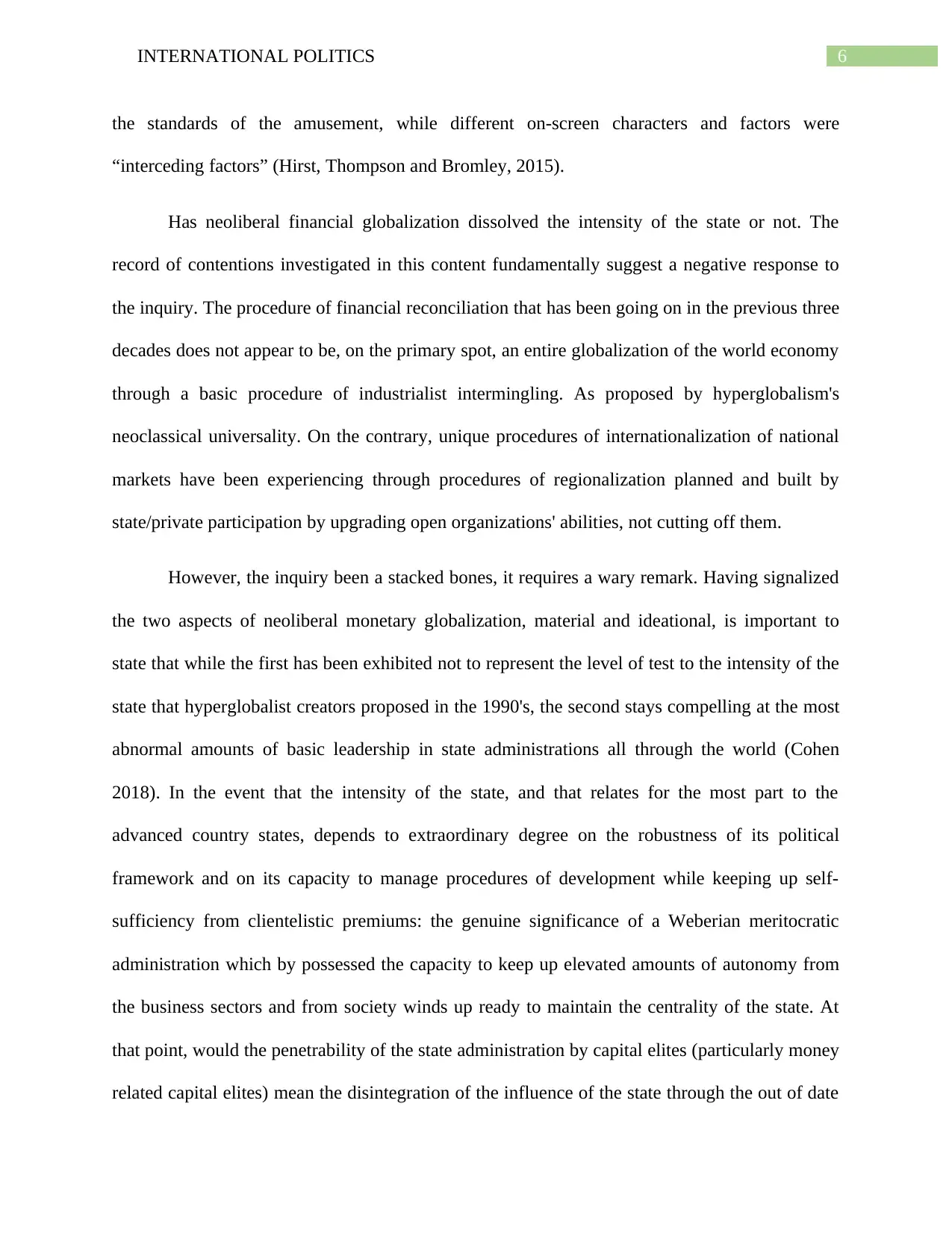
6INTERNATIONAL POLITICS
the standards of the amusement, while different on-screen characters and factors were
“interceding factors” (Hirst, Thompson and Bromley, 2015).
Has neoliberal financial globalization dissolved the intensity of the state or not. The
record of contentions investigated in this content fundamentally suggest a negative response to
the inquiry. The procedure of financial reconciliation that has been going on in the previous three
decades does not appear to be, on the primary spot, an entire globalization of the world economy
through a basic procedure of industrialist intermingling. As proposed by hyperglobalism's
neoclassical universality. On the contrary, unique procedures of internationalization of national
markets have been experiencing through procedures of regionalization planned and built by
state/private participation by upgrading open organizations' abilities, not cutting off them.
However, the inquiry been a stacked bones, it requires a wary remark. Having signalized
the two aspects of neoliberal monetary globalization, material and ideational, is important to
state that while the first has been exhibited not to represent the level of test to the intensity of the
state that hyperglobalist creators proposed in the 1990's, the second stays compelling at the most
abnormal amounts of basic leadership in state administrations all through the world (Cohen
2018). In the event that the intensity of the state, and that relates for the most part to the
advanced country states, depends to extraordinary degree on the robustness of its political
framework and on its capacity to manage procedures of development while keeping up self-
sufficiency from clientelistic premiums: the genuine significance of a Weberian meritocratic
administration which by possessed the capacity to keep up elevated amounts of autonomy from
the business sectors and from society winds up ready to maintain the centrality of the state. At
that point, would the penetrability of the state administration by capital elites (particularly money
related capital elites) mean the disintegration of the influence of the state through the out of date
the standards of the amusement, while different on-screen characters and factors were
“interceding factors” (Hirst, Thompson and Bromley, 2015).
Has neoliberal financial globalization dissolved the intensity of the state or not. The
record of contentions investigated in this content fundamentally suggest a negative response to
the inquiry. The procedure of financial reconciliation that has been going on in the previous three
decades does not appear to be, on the primary spot, an entire globalization of the world economy
through a basic procedure of industrialist intermingling. As proposed by hyperglobalism's
neoclassical universality. On the contrary, unique procedures of internationalization of national
markets have been experiencing through procedures of regionalization planned and built by
state/private participation by upgrading open organizations' abilities, not cutting off them.
However, the inquiry been a stacked bones, it requires a wary remark. Having signalized
the two aspects of neoliberal monetary globalization, material and ideational, is important to
state that while the first has been exhibited not to represent the level of test to the intensity of the
state that hyperglobalist creators proposed in the 1990's, the second stays compelling at the most
abnormal amounts of basic leadership in state administrations all through the world (Cohen
2018). In the event that the intensity of the state, and that relates for the most part to the
advanced country states, depends to extraordinary degree on the robustness of its political
framework and on its capacity to manage procedures of development while keeping up self-
sufficiency from clientelistic premiums: the genuine significance of a Weberian meritocratic
administration which by possessed the capacity to keep up elevated amounts of autonomy from
the business sectors and from society winds up ready to maintain the centrality of the state. At
that point, would the penetrability of the state administration by capital elites (particularly money
related capital elites) mean the disintegration of the influence of the state through the out of date
Paraphrase This Document
Need a fresh take? Get an instant paraphrase of this document with our AI Paraphraser
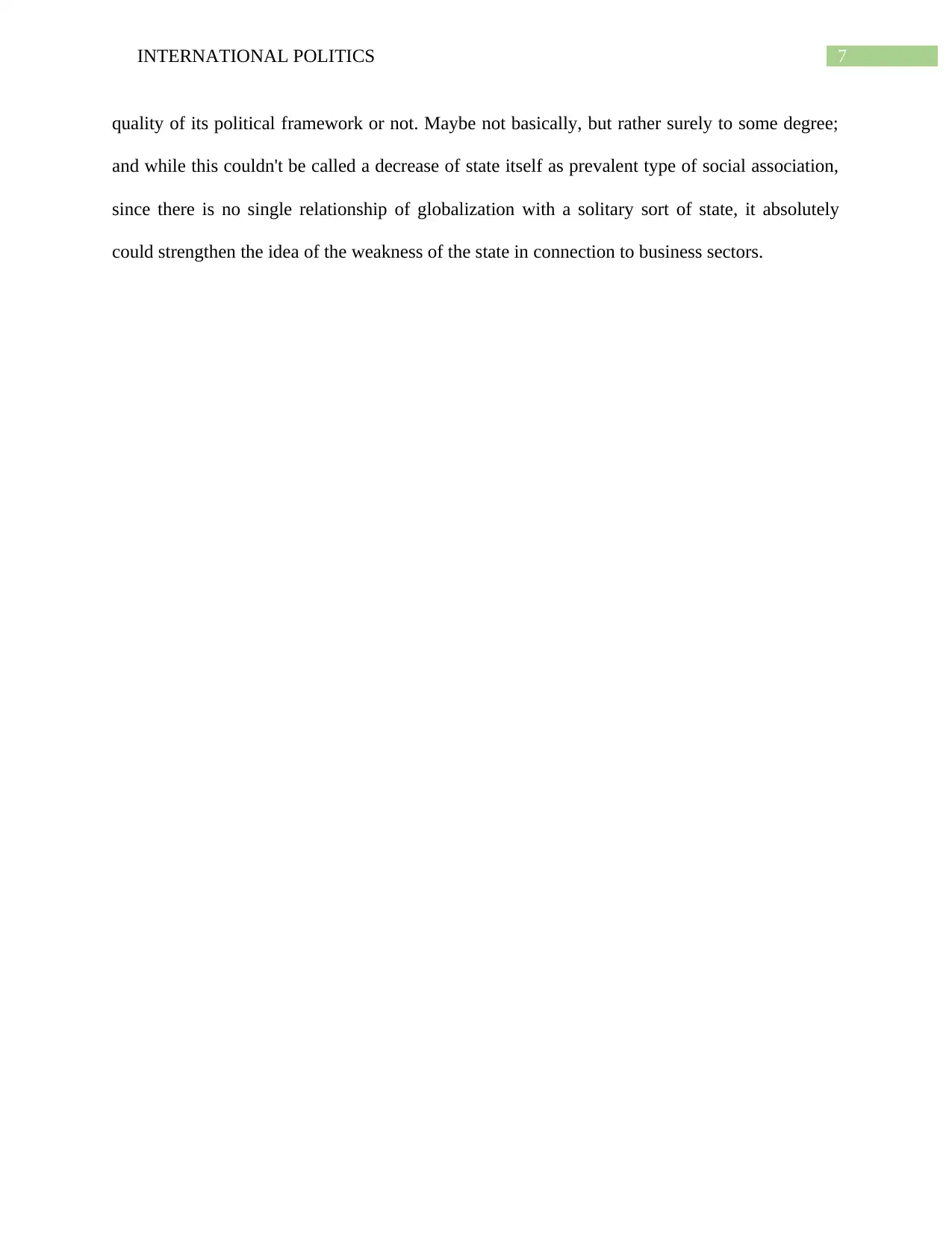
7INTERNATIONAL POLITICS
quality of its political framework or not. Maybe not basically, but rather surely to some degree;
and while this couldn't be called a decrease of state itself as prevalent type of social association,
since there is no single relationship of globalization with a solitary sort of state, it absolutely
could strengthen the idea of the weakness of the state in connection to business sectors.
quality of its political framework or not. Maybe not basically, but rather surely to some degree;
and while this couldn't be called a decrease of state itself as prevalent type of social association,
since there is no single relationship of globalization with a solitary sort of state, it absolutely
could strengthen the idea of the weakness of the state in connection to business sectors.
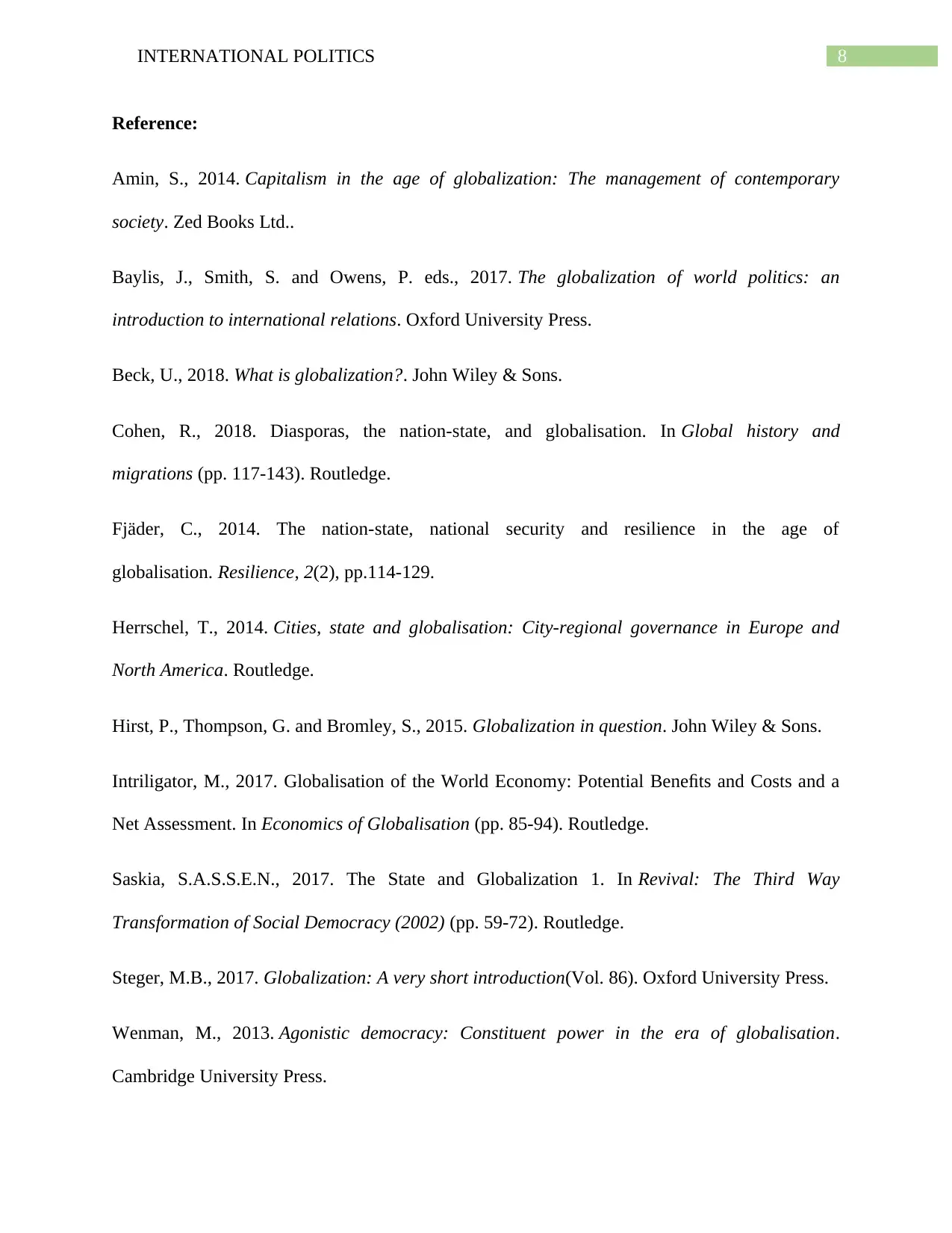
8INTERNATIONAL POLITICS
Reference:
Amin, S., 2014. Capitalism in the age of globalization: The management of contemporary
society. Zed Books Ltd..
Baylis, J., Smith, S. and Owens, P. eds., 2017. The globalization of world politics: an
introduction to international relations. Oxford University Press.
Beck, U., 2018. What is globalization?. John Wiley & Sons.
Cohen, R., 2018. Diasporas, the nation-state, and globalisation. In Global history and
migrations (pp. 117-143). Routledge.
Fjäder, C., 2014. The nation-state, national security and resilience in the age of
globalisation. Resilience, 2(2), pp.114-129.
Herrschel, T., 2014. Cities, state and globalisation: City-regional governance in Europe and
North America. Routledge.
Hirst, P., Thompson, G. and Bromley, S., 2015. Globalization in question. John Wiley & Sons.
Intriligator, M., 2017. Globalisation of the World Economy: Potential Benefits and Costs and a
Net Assessment. In Economics of Globalisation (pp. 85-94). Routledge.
Saskia, S.A.S.S.E.N., 2017. The State and Globalization 1. In Revival: The Third Way
Transformation of Social Democracy (2002) (pp. 59-72). Routledge.
Steger, M.B., 2017. Globalization: A very short introduction(Vol. 86). Oxford University Press.
Wenman, M., 2013. Agonistic democracy: Constituent power in the era of globalisation.
Cambridge University Press.
Reference:
Amin, S., 2014. Capitalism in the age of globalization: The management of contemporary
society. Zed Books Ltd..
Baylis, J., Smith, S. and Owens, P. eds., 2017. The globalization of world politics: an
introduction to international relations. Oxford University Press.
Beck, U., 2018. What is globalization?. John Wiley & Sons.
Cohen, R., 2018. Diasporas, the nation-state, and globalisation. In Global history and
migrations (pp. 117-143). Routledge.
Fjäder, C., 2014. The nation-state, national security and resilience in the age of
globalisation. Resilience, 2(2), pp.114-129.
Herrschel, T., 2014. Cities, state and globalisation: City-regional governance in Europe and
North America. Routledge.
Hirst, P., Thompson, G. and Bromley, S., 2015. Globalization in question. John Wiley & Sons.
Intriligator, M., 2017. Globalisation of the World Economy: Potential Benefits and Costs and a
Net Assessment. In Economics of Globalisation (pp. 85-94). Routledge.
Saskia, S.A.S.S.E.N., 2017. The State and Globalization 1. In Revival: The Third Way
Transformation of Social Democracy (2002) (pp. 59-72). Routledge.
Steger, M.B., 2017. Globalization: A very short introduction(Vol. 86). Oxford University Press.
Wenman, M., 2013. Agonistic democracy: Constituent power in the era of globalisation.
Cambridge University Press.
⊘ This is a preview!⊘
Do you want full access?
Subscribe today to unlock all pages.

Trusted by 1+ million students worldwide
1 out of 9
Related Documents
Your All-in-One AI-Powered Toolkit for Academic Success.
+13062052269
info@desklib.com
Available 24*7 on WhatsApp / Email
![[object Object]](/_next/static/media/star-bottom.7253800d.svg)
Unlock your academic potential
Copyright © 2020–2026 A2Z Services. All Rights Reserved. Developed and managed by ZUCOL.





